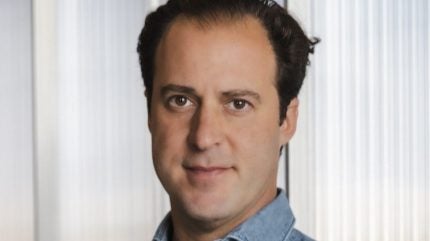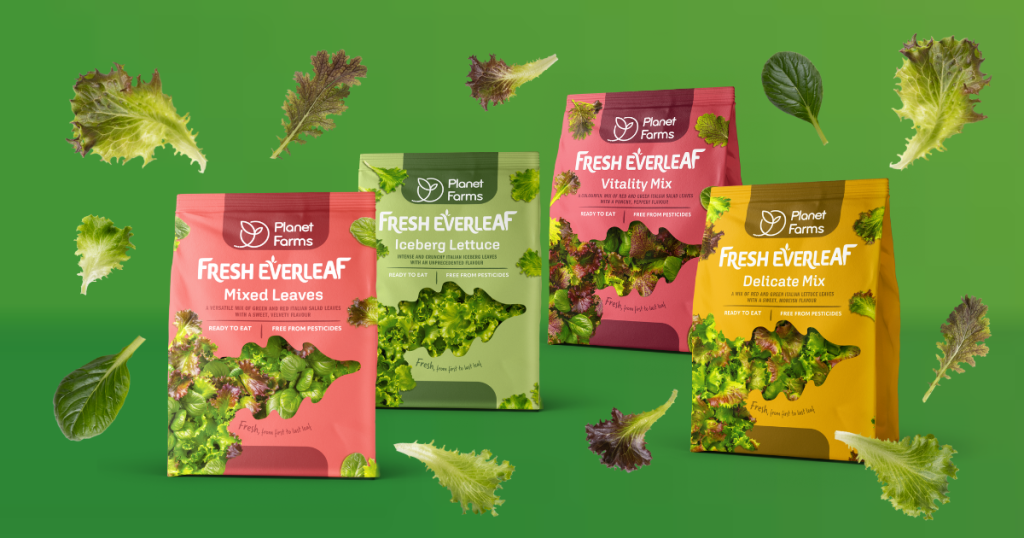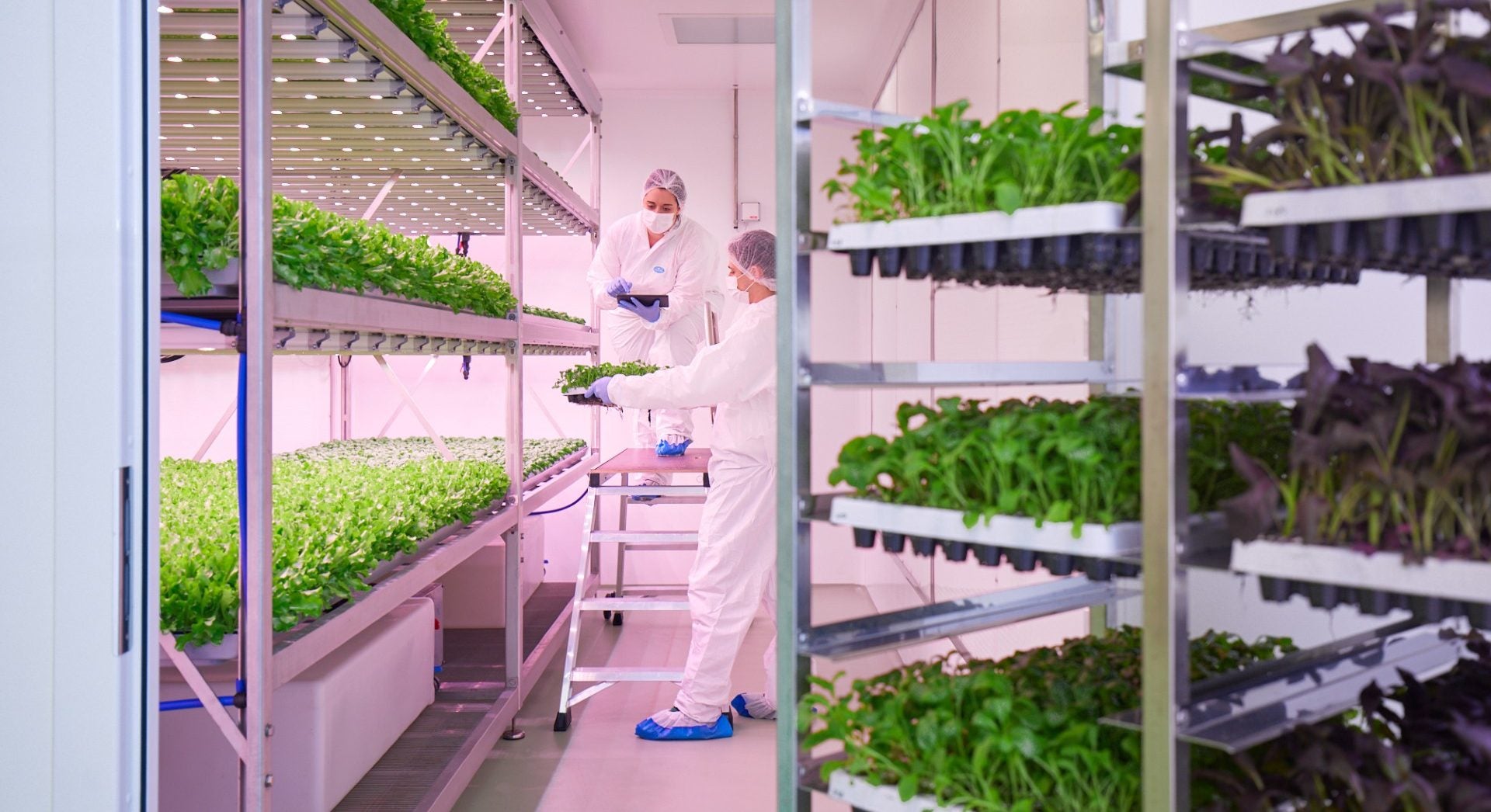
Planet Farms is not your typical vertical-farming business growing microgreens, salad leaves and herbs in a controlled indoor environment.
The Italy-based company, set up in 2018 by Daniele Benatoff and Luca Travaglini, has its eyes on a bigger pie beyond leafy greens with coffee, and even cotton. And rather than being narrowly focused on supermarkets – Planet Farms has just won a contract to supply Waitrose in the UK – it aims to bag industrial customers, too.

Discover B2B Marketing That Performs
Combine business intelligence and editorial excellence to reach engaged professionals across 36 leading media platforms.
Fresh off the launch of a joint venture with Swiss Life Asset Managers, part of the Swiss Life Group, and with new funding in hand to expand operations into the UK and Scandinavia, CEO Benatoff chats with Just Food’s Simon Harvey.
Simon Harvey (SH): What’s your broad assessment of the industry given the number of vertical-farming companies that have gone out of business?
Daniele Benatoff (DB): It’s not surprising that the US and the UK have had their fair share as they had more than their fair share of start-ups in the space because there was a lot of capital available.
Part of the issue in this sector is it was approached as a pure technology business. But the reality is this is a complex business because it brings together three different technological innovations under one roof.
There is a software element with pure technology, if you want to call it that, but there’s also an agronomy element and a hardware and automation element.

US Tariffs are shifting - will you react or anticipate?
Don’t let policy changes catch you off guard. Stay proactive with real-time data and expert analysis.
By GlobalDataThe complexity in the business has been getting it right in terms of bringing together all three of these disciplines in one cohesive process, which goes from seed to create a ready-to-eat product and doing that with a combination of having the right investment size and being efficient with the use of capital to build these farms.
Most importantly is minding the cash flow for a company like ours. That means two things – making sure that everything you produce you make money on and, in the heyday of venture capital, people forgot that.
The pitch was: I’ll get better with time, and I’ll get bigger with time, and this problem will go away. But the truth is, if you do the same thing today that you did yesterday and so on, that problem doesn’t go away.
The other problem is the amount of other money you spend and that’s been the issue mainly with our US competitors, where, if on top of the farms, you layer on a cost base of 50 to 100 million [dollars] per year. You’re not Microsoft. You don’t have the base to absorb that.
Where we’ve probably been a little better at execution is we had a clear vision eight years ago. We went through a frustrating number of years where no one ever heard of us, and we said, ‘but we think we have the best technology in the world, why does no one know us?’ That’s because most of the news was about capital raises, and therefore you were not known based on how good you were or how good your product was.
We measured ourselves with probably what is the hardest market because Italy has a high cost of energy – higher than the UK – and a lot of aversion to innovation in general, especially in food.
We had to sit tight and execute day in and day out for three years until finally, all the stakeholders around us said: ‘Okay, this seems mature enough to now be rolled out and press on the gas and accelerate and replicate it.’
The UK is a country that embraces innovation. It’s a country where private enterprise is allowed to work
SH: Why has Planet Farms picked the UK for a new vertical farm?
DB: We think the UK is a very interesting market. It has a very evolved and concentrated retail market, which is useful for a company like us because, in order to achieve a broad national distribution you don’t need to have 100 customers, but you can have a couple of big supermarkets.
It’s also a country that embraces innovation. It’s a country where private enterprise is allowed to work and grow at speed with a limited amount of red tape or regulation, and it still attracts some of the best technical, financial and entrepreneurial brains from a large chunk of the world.
SH: Speaking with other vertical-farming companies in the past, the theme that emerged with many, if not most, was they were not profitable despite raising large amounts of cash from investors. What’s the status with Planet Farms?
DB: Keep in mind that my co-founder and myself and our management team still own over three quarters of the company. We always took the view that for every pound we lose or spend about three quarters of it is ours. The result of that is our site is profitable. And without that, there would be no reason to build out others.
The reason why an investor like Swiss Life is investing with us is because these facilities are profitable and they generate an attractive return on investment, which means that there is appetite to invest more and build others.
SH: Linked with that profitability issue is the fact some vertical-farming companies were expanding beyond just leafy greens and herbs into things like strawberries when they weren’t making any money. What’s your view on that?
DB: The second part of the story has been, ‘I lost money on leafy greens but now I’m going to more value-added crops like strawberries, and watch this space, I’ll make a killing there.’
SH: So running before you can walk?
DB: It’s not just that. You need an efficient system and if you have an efficient system, you can produce salads and strawberries.
Where we’re different is we’re profitable and that’s why, even at a time when other people are going belly up, very serious institutional investors were interested in backing us to build others because our facilities make money.
Part two is the whole construct of the company because it’s two companies under one roof – the facilities and a big technology business, which is bigger than the operating business.
SH: So Planet Farms develops and builds its technology in-house?
DB: We own and operate farms and we develop the full technology and design them. We build our facilities from scratch. We are also not trying to reinvent the wheel. Some of the US players have started designing their own lights and their own machinery. You’re never going to be better than Philips or Siemens or ABB at doing that. That’s their business.
We design the system, the entire software that manages the facility, we do all the agronomy work to make sure that the product is the best it can be, and then we source machinery and equipment.
The overall group is turning profitable at the end of this year, not just the assets but the company overall is turning profitable.
SH: What about products?
DB: Microgreens were the Holy Grail. It’s a great market but it’s tiny. Leafy greens are a great market because it’s large enough and there are serious quality issues in the existing product that’s on the shelf. Our Cirimido facility in Italy produces 80,000 bags of salad per day and is operated by six people.
Our goal is to continue supplying salads and herbs, but for the past four years we’ve focused a lot of our innovation on supplying ingredients to the food, beverage, cosmetics and perfumery industries, therefore providing ingredients that are mission critical to industrial customers to produce the products they put on the shelf every day.

SH: What ingredients are those?
DB: Think of anything that goes into creams. There are botanicals, herbs, flowers, roots, stuff that goes into perfumes, stuff that goes into spirits. All of those use an enormous list of ingredients which are very hard to source and are very volatile.
In order to do that, we needed a big, solid financial backer because these customers are no longer supermarkets. They’re very large global industrial companies. They need to make sure that if they are relying on my supply I will be around in five years.
SH: It’s all about diversification then?
DB: What we are trying to create is a real technological platform in agriculture. If you think of the entire amount of capital that’s gone into talent, effort, if that was all to supply, whatever, 5% of the salad needs of the country, that was probably a wasted effort.
We’re going to start creating separate production sites that will supply these ingredients to these large corporates. The next stage of evolution, where we started the research four years ago, is the cotton supply chain and the coffee supply chain.
Markets which have a real, tangible issue of cost, quality and sustainability where we can give a real answer. We already grow cotton and coffee in Milan. We don’t do that on an industrial scale, that will take a bit of time.
We are a technology. This is not a greenhouse
SH: Can you explain the Planet Farms’ set up on the food side?
DB: We’ve got one very large-scale farm in Cirimido. We had a second one that was large scale, which unfortunately burned down in January last year, and we’ve got a very small one which serves a three Michelin star restaurant.

SH: What are the plans for further farms apart from the UK?
DB: Two each are planned for the UK and Scandinavia and then we’ve got plans for an additional two on top of those in Europe.
SH: Are you able to reveal any turnover figures?
DB: We don’t share financial figures, but to give you an order of magnitude, one of these facilities, give or take, will make around €20m ($22.8m) of turnover.
SH: Who are your main investors other than Swiss Life Asset Managers?
DB: We’ve had several investors, mostly industrial families or industrial businesses. Swiss Life is a joint venture purely to build and operate farms and does not involve the technology. The technology remains a standalone business, which will be a supplier to this joint venture.
We’ve had several rounds of funding, tiny compared to the American ones and we’ve used the capital as efficiently as we could. We’ve invested in the early stages to develop the salads and herbs business, which is paying off because the assets are making money and we’re now expanding that.
The plans for the company are the new farms in Europe, the joint venture with Swiss Life, and to really accelerate the B2B business in terms of producing mission-critical ingredients for large industrial customers.
SH: Where does the vertical farming industry go from here and what’s the key challenge to make it more mainstream? Does that lie with the consumer?
DB: If you’ve got the right product at the right price, which you deliver day in and day out with good service levels, then customers are never the problem. They may take a little longer or be a little slower in adapting.
The key for us is to follow a technology curve. We are a technology. This is not a greenhouse. This is a new technological approach to produce high-quality agricultural goods, and it needs to follow a technology curve where you learn, and learning means exactly what happened to your cell phone.





